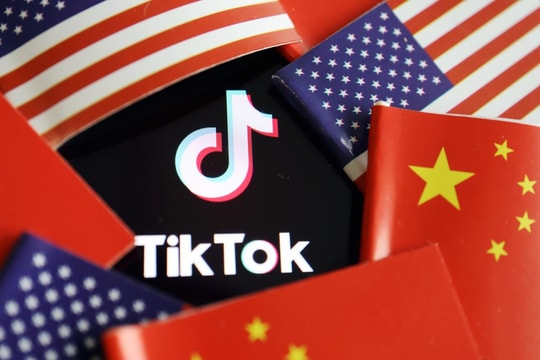TikTok asserts US ban is 'unconstitutional'
On September 16, TikTok filed a lawsuit against the US ban in federal court, arguing that the law targeting the short video platform is "unconstitutional".
In the latest development in the tense legal battle, Andrew Pincus, a lawyer representing TikTok and its parent company ByteDance, has tried to convince a federal appeals court to suspend the implementation of the law banning the app in the US. The law, which is scheduled to take effect on January 19, has caused a wave of fierce protests from users and the technology industry.
TikTok’s lawyers argued that the law severely violated constitutional freedom of speech and that abruptly banning the app would cause irreparable harm to millions of American users. They cited specific examples of how TikTok has contributed to the diversity of social media platforms and created business opportunities for many individuals and businesses.

However, the judges asked tough questions, asking TikTok to clarify the national security risks the law seeks to address and how TikTok can ensure user data is securely protected.
In April 2024, President Joe Biden signed into law a controversial bill that set a January 19, 2025, deadline for ByteDance, TikTok's China-based parent company, to sell its entire stake in the app to a buyer approved by the US government.
The decision comes after growing concerns about potential national security risks associated with TikTok, with the US government concerned that the Chinese government could force ByteDance to share US user data or use the platform for espionage or manipulation.
In their lawsuit challenging the ban, TikTok and ByteDance have made a strong legal argument. The companies argue that the Protecting Americans from Foreign-Controlled Apps Act (the Act) is “unconstitutional” because it directly violates the First Amendment of the US Constitution, which guarantees freedom of speech.
According to TikTok and ByteDance, the US government’s order forcing a private company to sell a social media platform like TikTok is an excessive interference with the freedom of expression of millions of American users. Moreover, the company argues that the law is unenforceable because it does not provide a clear and objective criterion for assessing what constitutes an “app controlled by a foreign adversary” and finding a suitable buyer in the short term is impossible.
However, Judge Sri Srinivasan, one of three judges on the US Court of Appeals for the District of Columbia, made a contrary argument, emphasizing concerns about a foreign entity like ByteDance being able to control and manipulate content on TikTok.
Judge Sri Srinivasan said the case was particularly dangerous because it involved national security. "This is not just a case about free speech," he stressed, "but also about the possibility that a foreign government could use this platform to interfere in the internal affairs of the United States." Srinivasan argued that free speech does not protect foreign organizations that want to operate on US soil without complying with US laws.
The lawsuit notes that the immediate effect of this law would be to completely shut down TikTok in the US. This would mean that more than 170 million US users would be deprived of access to a platform that has become an integral part of their daily lives. TikTok is not just an entertainment app, but also an important tool for connecting, sharing information and creating content.
The lawsuit emphasizes that the “conditional divestment” requirement of the law is completely unworkable. TikTok argues that separating part of its platform from ByteDance’s complex global system would be a nearly impossible technical task. Additionally, finding a buyer that meets all the national security and financial requirements in a short period of time would be impossible.
Former US Treasury Secretary Steven Mnuchin and billionaire Frank McCourt have expressed interest in buying TikTok, although the Chinese government has signaled it would oppose the sale due to restrictions on selling sensitive technology.
Opponents of the bill note that the ban would also disrupt the worlds of marketing, retail, and the lives of various content creators, some of whom are also suing the US government. TikTok is paying the legal costs of that lawsuit.
In legal filings this summer, the US Department of Justice (DoJ) expressed deep concerns about TikTok's operations, focusing on two main issues: the large-scale collection of user data and the possibility of manipulation by the Chinese government.
Specifically, the DoJ said that TikTok has collected and stored a huge amount of personal data of users, including not only basic information such as names and email addresses, but also more sensitive data such as browsing history, personal preferences, and even biometric information (if users allow). The concern is that this data could be transferred to the Chinese government, violating US information security laws and causing national security risks.
The DoJ also stressed that TikTok's algorithm, which determines what content users see on the app, could be used by the Chinese government to manipulate public opinion, spread misinformation, or even influence elections. This raises questions about the platform's neutrality and objectivity.
TikTok has repeatedly said it does not share US user data with the Chinese government. The company has made public commitments to data security and storing US user data in US data centers. Despite this, national security concerns continue to be raised by US lawmakers, but so far no concrete evidence has been presented to support these allegations.
Legal experts predict the case will go through a long and complicated legal process. After the federal court issues its ruling, the dissatisfied party will almost certainly appeal to the Supreme Court. This means the case could drag on for years, through multiple levels of court, before a final decision is reached.





